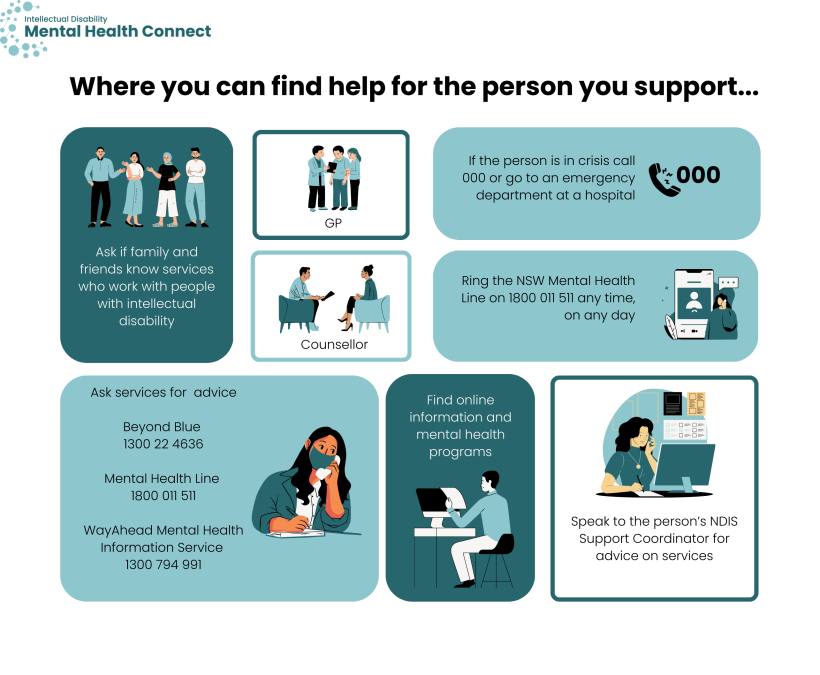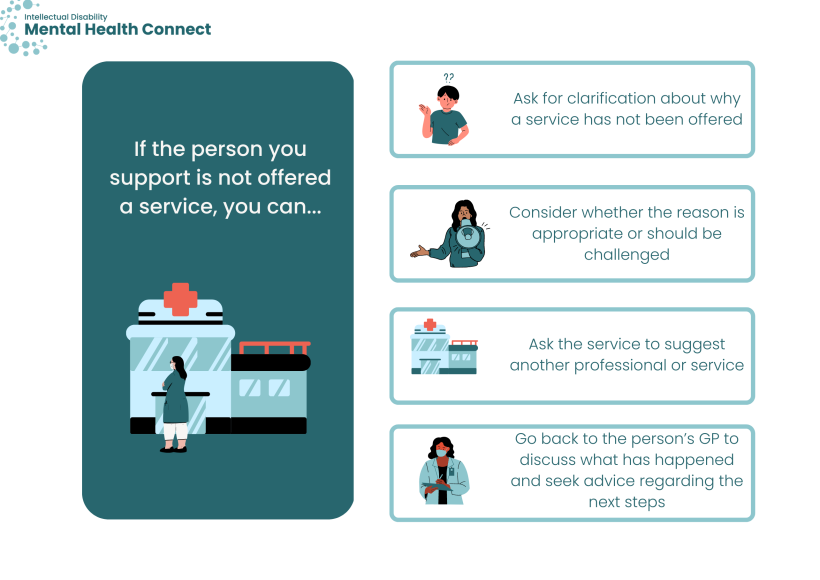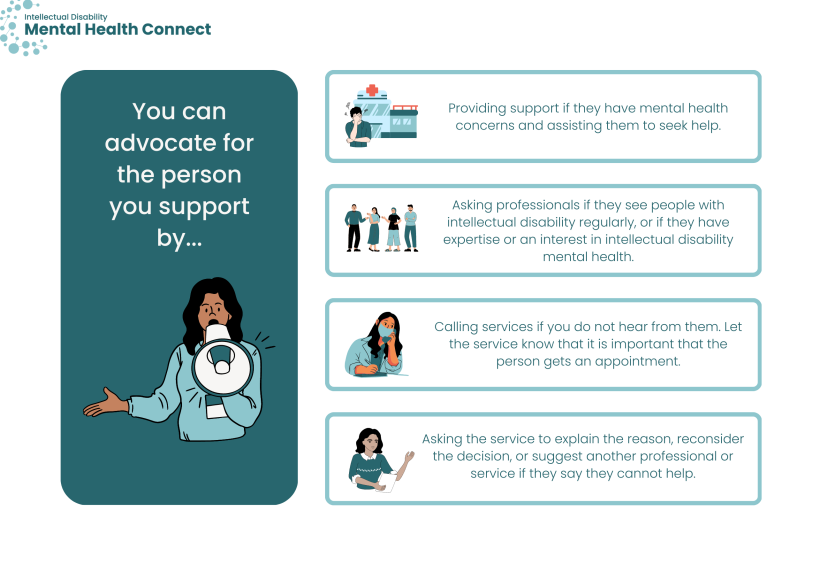People with intellectual disability and their support networks often tell us that things do not work and they cannot get the help they need for their mental health.
On this page, you will find some common problems people have when trying to get help for their mental health and how you can assist. For more information, you can view How to advocate within the I am a person with intellectual disability section.
It can be hard to know where and how to find mental health help for the person you support. But help is available.

- If the person is in crisis
- If the person or someone else’s life is in danger:
- Call 000 for an ambulance or the police or
- go to an emergency department at a hospital. You can go to an emergency department without an appointment.
- If the person or someone else’s life is in danger:
- If the person is highly distressed, but their or someone else’s life is not in danger:
- you can ring the NSW Mental Health Line on 1800 011 511 any time, on any day if you need to speak with a mental health professional. The mental health professional will ask you questions about the person’s mental health and what sort of help they need. They may refer the person to the local mental health team or they may give you information and contact details about other services that can help them.
- support the person to get an immediate appointment with their GP, if appropriate or contact their community mental health service if already in contact.
-
Support the person to call their emergency contacts. They might keep this information on an emergency card. If the person does not have an emergency card, at a time that is good for them, you can encourage the person to make an Emergency card.
- Go to a GP.
- Ask other services for initial advice
- There are mental health phone numbers that can offer advice on where to start. These include:
- Beyond Blue on 1300 22 4636
- Mental Health Line on 1800 011 511
- WayAhead Mental Health Information Service on 1300 794 991.
- There are mental health phone numbers that can offer advice on where to start. These include:
- Talk to a counsellor.
- Find online information and mental health programs.
- Ask if family and friends know of any services who have experience working with people with intellectual disability.
- Speak to the person’s NDIS Support Coordinator for advice on services if the person you support has an NDIS plan.
For more information about these options for finding help, see Where to start to get help within the section for people with intellectual disability.

Sometimes professionals and services may decline to offer a service to the person you support. This can happen for a range of different reasons, including:
- services not accepting a person because of their intellectual disability
- lack of knowledge about intellectual disability
- not knowing how to assist people with intellectual disability
- not knowing (and not knowing how to find out) what is normal for a person with intellectual disability
- not understanding the range of factors, including mental health issues and stress, that can contribute to behaviour.
- long waiting lists.
Not being offered a service can be discouraging to the person you support and those in their support networks. Sometimes not being offered a service is appropriate and sometimes it is not appropriate.
If the person you support is not offered a service, you can:
- ask for clarification about why a service has not been offered
- consider whether the reason is appropriate or should be challenged
- ask the service to suggest another professional or service
- go back to the person’s GP to discuss what has happened and seek advice regarding the next steps (e.g. the GP advocating for a service or referring to another service).
If the GP does not know of a mental health professional who has experience working with intellectual disability in their area, you can:
- encourage them to contact the local mental health service and speak to a senior staff member for advice
- encourage them to search online portals for suitable practitioners. These may include the Australian Psychological Society and the Royal Australian and New Zealand College of Psychiatrists' Your Health in Mind directories
- encourage them to contact the Statewide Intellectual Disability Mental Health Outreach Service or the Sydney Children’s Hospital Network Mental Health and Intellectual Disability Hub for advice. These services are only open to registered health professionals. You cannot contact the services directly
- ask if family and friends know of anyone suitable
- speak to the person’s NDIS Support Coordinator for advice if the person you support has an NDIS plan.
The person you support may not be happy with the mental health professional they are seeing. For example, they may not understand or feel comfortable with the mental health professional. There are things that you can do to help.
If the person does not understand the mental health professional
You can:
- make sure the person you support knows that it is OK to let the mental health professional know if they do not understand
- tell the mental health professional how the person you support best understands information (e.g. writing information down, using pictures, or using simple words and phrases)
- support the mental health professional to use the communication aids that the person may require
- help facilitate communication during sessions or appointments, if that is OK with the person you support.
If the person does not feel comfortable with the mental health professional
If the person you support does not feel comfortable with the mental health professional or does not think the health professional knows enough about how they could help, you can:
- let the person know it is OK to say they do not want to see the mental health professional again
- ask the person if they would feel comfortable working the problem out with the mental health professional
- if the problem cannot be worked out and the person with intellectual disability remains unhappy with the service they are receiving, support the person to consider whether they wish to make a complaint. See the Complaints mechanism section below for more information.
- go back to the person’s GP to help find another mental health professional. You can also find information on how to find different types of mental health professionals in the Health workers section.
Sometimes treatments may not make the person you support feel better. If the treatment is not helping, you can:
- keep a diary about what has helped the person and what has not worked
- make an appointment with the person’s GP or mental health professional to discuss any issues or questions the person or yourself may have. You can bring any diaries and notes about what has helped and what has not worked
- find another mental health professional, if the person you support is not happy with the service they are receiving
- discuss any medication side effects with the person’s GP or psychiatrist. They may be able to try a different dosage or trial a different type of medication
- encourage the person to seek a medication review. They could also obtain a Home Medicines Review, where an accredited pharmacist will check that the person is taking their medications correctly.
- The person may want to seek a medication review if:
- they are experiencing serious or ongoing side effects
- the medication does not seem to be helping
- the person has not had a review for a long time
- the person’s treatment plan advises that they do so
- the person receives advice from their GP or other health professional that they should.
- The person may want to seek a medication review if:
- encourage the person’s mental health team to ask for advice from a specialised intellectual disability mental health service.

After the person you support is discharged from a service, they may still need help and support to continue recovering and maintain good mental health.
You can:
- contact (or encourage the person to contact) their health professionals if they start to feel unwell again or do not have enough support when they go home
- support the person to attend follow-up appointments
- if they have trouble getting to appointments, you can ask if the mental health professional can make a home visit or meet the person somewhere else that suits them
- support the person to call the contact number on the Transfer of Care plan to determine ways the person can get to their appointment
- if the person has an NDIS plan, communicate with the person’s NDIS coordinator about transport options
- if the person has an NDIS plan but they do not have the supports they need when they leave hospital, speak to their NDIS support coordinator.
If the person you support is not happy with a mental health service they are receiving or they are worried about how they are being treated by mental health professionals, they have a right to make a complaint. Making a complaint is free.
Making a complaint can be difficult and stressful, particularly for people with intellectual disability. You can support the person to make a complaint by:
- discussing the person’s concerns with them
- showing the person Easy Read information about making complaints about mental health care
- discussing the problem with the mental health professional’s manager
- speaking with a patient representative or Official Visitor if the person you support is staying in hospital
- helping the person to write the complaint. Often, complaints may need to be made in writing (e.g. the Health Care Complaints Commission requires a complaint to be submitted in writing)
- advocating on behalf of the person.
The Health Care Complaints Commission is a government service that looks into complaints about health care that people receive, including complaints about the quality of care and treatment provided. If the person you support wants to complain about a service, you could support them to make a complaint with the Health Care Complaints Commission. More information about the Commission and how to make a complaint can be found in the I am a person with intellectual disability section I am not happy with the service.
Advocacy is helping someone to have their voice heard and needs met. A person can also advocate for themselves. This is called self-advocacy. You can find more information about advocacy and self-advocacy in About advocacy within the section for people with intellectual disability.
You can advocate effectively for the person you support by:
- providing support if they have mental health concerns and assisting them to seek help
- asking mental health or health professionals if they see other people with intellectual disability regularly, or if they have expertise or an interest in intellectual disability mental health
- calling services if they have said they will call back but you or the person you support do not hear from them. You can advocate for the person by telling the service that it is important that the person gets an appointment.
- asking a service to explain the reason, reconsider the decision or suggest another professional or service, if they say they cannot help.

How to find an advocate
Sometimes, you may want to help the person you support find an advocate who is not a family member, friend or supporter. There are different types of advocates, including:
- peer advocates – people who have disability themselves
- professional advocates – people who are paid to help advocate for people.
You can find more information about different types of advocates here.
You can find organisations that can link the person you support with an advocate at:
- Disability Advocacy Network Australia – find an advocacy organisation
- Voices Together – find a self-advocacy group
- People with Disability Australia, or contact their Wayfinder Hub on 1800 843 929 or [email protected]
- Intellectual Disability Rights Service, if the person needs legal advocacy
- Mental Health Advocacy Service – A statewide service that provides free legal information, advice and assistance about mental health.
